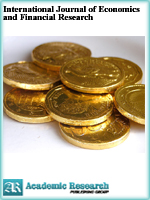International Journal of Economics and Financial Research
Online ISSN: 2411-9407
Print ISSN: 2413-8533
Print ISSN: 2413-8533
Quarterly Published (4 Issues Per Year)

Archives
Volume 10 Number 1 March 2024
Profitability and Competitiveness of the Mango Sector in Ivory Coast
Authors: KOUAKOU Kouakou Paul-Alfred
Pages: 12-16
DOI: doi.org/10.32861/ijefr.101.12.16
Abstract
The aim of this study is to assess the profitability and competitiveness of the main actors in the mango sector in Ivory Coast. To achieve this, Monke and Pearson (1989) Policy Analysis Matrix (PAM) is used to analyze data collected from surveys carried out from October to November 2022 in the Korhogo department. The results show that the various links in the value chain studied are financially and economically profitable. In addition, the mango value chain presents a comparative advantage for the locality studied and the nation of Ivory Coast. However, the country is not yet reaping the full benefits of these foreign exchange gains, given the high rate of post-harvest losses (between 30% and 40%) and the low level of production and exports due to fruit flies. Therefore, to improve the profitability and competitiveness of the mango sector, development policies need to focus on exempting the main actors from various taxes and reducing export customs duties, value-added taxes and capital taxes, which are the main distortions.
Composite Model Analysis in Forecasting the Malaysian Imports
Authors: Mohamed AH Milad ; Hanan Moh. B. Duzan
Pages: 1-11
DOI: doi.org/10.32861/ijefr.101.1.11
Abstract
For more than a century, forecasting models have been crucial in a variety of fields. Models can offer the most accurate forecasting outcomes if error terms are normally distributed. Finding out a good statistical model for time series predicting imports in Malaysia is the main target of this study. The decision made during this study mostly addresses Vector Error Correction Method (VECM), composite model (Combined regression-ARIMA), and ARIMA model. The imports of Malaysia from the first quarter of 1991 to the first quarter of 2023 are employed in this study’s quarterly time series data. The forecasting outcomes of the current study demonstrated that the composite model offered more probabilistic data, which improved forecasting the volume of Malaysia’s imports. The (ARIMA) mode, composite model, and VECM model in this study are linear models based on responses to Malaysia’s imports. Future studies might compare the performance of nonlinear and linear models in forecasting.



